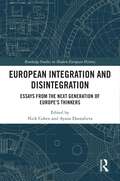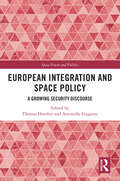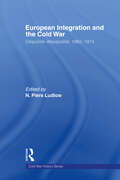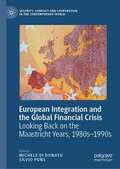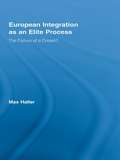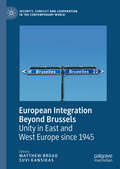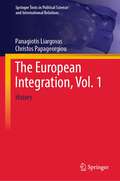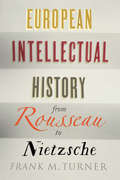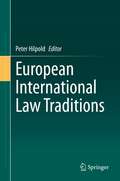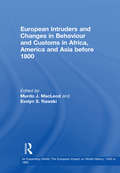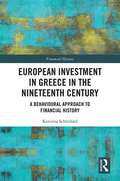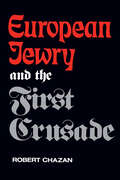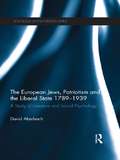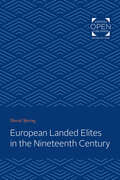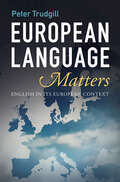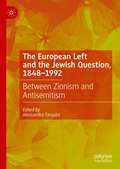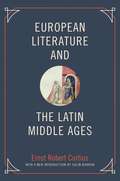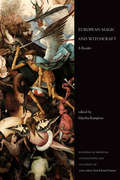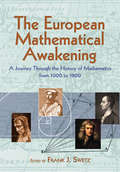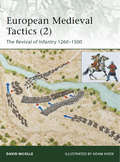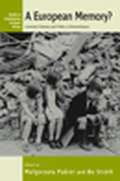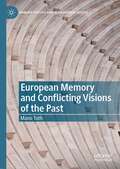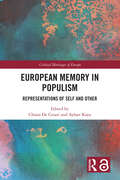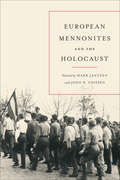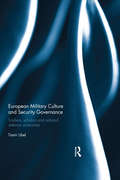- Table View
- List View
European Integration and Disintegration: Essays from the Next Generation of Europe's Thinkers (Routledge Studies in Modern European History)
by Nick CohenEuropean integration is an ambitious goal that attempts to reconcile grandiose visions for the future of Europe with complicated national attitudes toward unity. The added complexity of political crises, which have characterized the European project from its outset, makes the success of the European Union far from guaranteed. Today, European unity is once again at an existential crossroad, with internal and external challenges threatening its integration. This volume uniquely brings together the novel perspectives of Europe’s emergent generation of thinkers to analyze through interdisciplinary lenses these various disintegrative pressures. Students and scholars of Europe as well as those interested in the future of European cohesion will enjoy this volume, both for the interdisciplinary analysis it brings forth and for the window it provides into the thinking of Europe’s next generation of leaders.
European Integration and Space Policy: A Growing Security Discourse (Space Power and Politics)
by Thomas Hoerber and Antonella ForganniThis volume addresses developments in European space policy and its significance for European integration, using discourse theory as a framework. It seeks to address the developments in European space policy by examining several sensitive security questions linked in general with space activities, on the one hand, and the interplay between space policy and security policy in the European Union (EU) on the other. The book argues that defence and security matters should be studied for a better understanding of space projects in their historical, political, economic, legal and social context. The volume seeks to answer the following key questions: • What can space policy contribute to European identity formation and the integration process? • What are the interests of member states/EU institutions in space? • How is space policy perceived by European institutions, and how have they been engaged in the policy process to promote activity in space? • In which ways is the EU engaged in space, in terms of policy areas, e.g. foreign policy, industrial policy, security and defence policies? • What is the impact of institutions on the policy-making process in European space policy? This book will be of interest to students of EU policy, space policy, discourse studies and International Relations in general.
European Integration and the Cold War: Ostpolitik-Westpolitik, 1965-1973 (Cold War History)
by N. Piers LudlowThis edited volume uses newly released archival material to show linkages between the development of the European Union and the Cold War. Containing essays by well-known Cold War scholars such as Jussi Hanhimaki, Wilfried Loth and Piers Ludlow, the book looks at: France, where neither de Gaulle nor Pompidou felt committed to the status quo in East-West or West-West relations Germany, where Brandt’s Ostpolitik was acknowledged to be linked to the success of Bonn’s Westpolitik and Britain, where the move towards Community membership was tightly bound up with a variety of calculations about the organization of the West and its approach to the Cold War. Nixon and Kissinger’s policies are set out as the background of US policy against which each of the European players was compelled to operate, explaining how Washington saw European integration as part of the over-arching Cold War. European Integration and the Cold War will appeal to students of Cold War history, European politics, and international history.
European Integration and the Global Financial Crisis: Looking Back on the Maastricht Years, 1980s–1990s (Security, Conflict and Cooperation in the Contemporary World)
by Michele Di Donato Silvio PonsOffering a fresh take on a crucial phase of European history, this book explores the years between the 1980s and 1990s when the European Union took shape. Whilst contributing to existing literature on the Maastricht Treaty and European integration at the end of the twentieth century, the book also brings those debates into the twenty-first century and makes connections with longer-term issues. The transformation of the European political climate in the wake of the global financial crisis in 2008, and the watershed Brexit vote in 2016, has made it all the more urgent to reconsider the way scholars and opinion-makers have looked at European integration in the past. Drawing from recently released archival documents, the authors analyse European cooperation as part of the broader international history in which it unfolded, taking into account the changes in the Cold War order and the advance of a new phase of globalisation. Comparing and contrasting the debates, objectives and achievements of the 1980s and 1990s with the current political landscape of the European Union, this book proposes a novel interpretation of the choices that were made during the Maastricht years, and of their longer-term consequences.
European Integration as an Elite Process: The Failure of a Dream? (Routledge Advances in Sociology #Vol. 40)
by Max HallerMax Haller's impressive book presents an analysis of the process of European integration which keeps the relation between elites and citizens at the forefront. It is shown on the basis of new empirical data (surveys, interviews, analyses of documents and biographies) that European integration has been led since the beginning by the elites and that today there exists a considerable split between elites and citizens; this split is becoming more profound in the course of time. The book covers the following themes: - the structure, interests and behaviour of the different elites (political, economic, bureaucratic) - the expectations and perceptions of the populations concerning the integration process and the elites - the strategies of the elites to win the consent of the people, in view of widespread scepticism - proposals for reform of the EU, especially with regard to a strengthening of democratic elements which could reduce the split between elites and citizens. A timely and original read, this book will be a useful addition to the library of any political sociologist, political scientist or scholar of European integration.
European Integration Beyond Brussels: Unity in East and West Europe Since 1945 (Security, Conflict and Cooperation in the Contemporary World)
by Matthew Broad Suvi KansikasEurope is a continent whose history has, in one form or another, long been dominated by integration. And yet the European integration process is often treated as synonymous with the evolution of just one particular, and until recently geographically quite limited, Western-centred organisation: the European Union (EU). This trend obscures the multitude of ways European states have acted collectively on both sides of the Iron Curtain – and continue to do so throughout the continent today. With contributors drawn from history and political science, this book explores some of these diverse integration efforts ‘beyond Brussels’. We shine a light on international organisations, trade frameworks, and various political, social, scientific and cultural forms of unity in both Eastern and Western Europe. In so doing, the book seeks to redefine the history of the European integration process not only as a less purely EU-centric phenomenon but as a less strictly Western European one too.
The European Integration, Vol. 1: History (Springer Texts in Political Science and International Relations)
by Panagiotis Liargovas Christos PapageorgiouThis two-volume textbook teaches about the uniqueness and the difficulty of the European unification project. It describes, as clearly as possible, what Robert Schuman declared in 1950, that "... Europe will not be made all at once…". Navigating the nexus of four academic fields - political science, institutional analysis, economics, and history - the book serves as a reference work for accurate, exhaustive, and well-researched information on the creation and functioning of the European Union. Supported by numerous photographs, diagrams, maps, and sources, volume 1 sets out in a concise and readable way the European historical origins, the important steps in the creation of the European Union, and the treaties and historical events that have marked its course so far. Providing a comprehensive picture of the unification process and the functioning of this sui generis edifice of a united Europe, the book will serve as an essential textbook for undergraduate and graduate students studying the subject of European integration, as well as a useful resource for a broader audience interested in the European integration process.
European Intellectual History from Rousseau to Nietzsche
by Frank M. Turner Richard A. LofthouseOne of the most distinguished cultural and intellectual historians of our time, Frank Turner taught a landmark Yale University lecture course on European intellectual history that drew scores of students over many years. His lectures--lucid, accessible, beautifully written, and delivered with a notable lack of jargon--distilled modern European history from the Enlightenment to the dawn of the twentieth century and conveyed the turbulence of a rapidly changing era in European history through its ideas and leading figures Richard A. Lofthouse, one of Turner's former students, has now edited the lectures into a single volume that outlines the thoughts of a great historian on the forging of modern European ideas. Moreover, it offers a fine example of how intellectual history should be taught: rooted firmly in historical and biographical evidence.
European International Law Traditions
by Peter HilpoldInternational Law is usually considered, at least initially, to be a unitary legal order that is not subject to different national approaches. Ex definition it should be an order that transcends the national, and one that merges national perspectives into a higher understanding of law. It gains broad recognition precisely because it gives expression to a common consensus transcending national positions.The reality, however, is quite different. Individual countries’ approaches to International Law, and the meanings attached to different concepts, often diverge considerably. The result is a lack of comprehension that can ultimately lead to outright conflicts.In this book, several renowned international lawyers engage in an enquiry directed at sorting out how different European nations have contributed to the development of International Law, and how various national approaches to International Law differ. In doing so, their goal is to promote a better understanding of theory and practice in International Law.
European Intruders and Changes in Behaviour and Customs in Africa, America and Asia before 1800 (An Expanding World: The European Impact on World History, 1450 to 1800 #Vol. 30)
by Evelyn S. RawskiEuropean intrusions had many impacts on invaded peoples, but less attention has often been paid to changes brought about by the encounter in everyday life and behaviour, both for the Europeans and the other cultures. What changed in diet, dress, agriculture, warfare and use of domesticated animals, for example ? To what degree were attitudes, and thus behaviours affected ? How did changes in the use of types of firearm reorder power structures, indeed lead to the rise and fall of competing local states ? Even the design and planning of houses and cities were affected. This volume looks at such changes in the early centuries of European expansion.
European Investment in Greece in the Nineteenth Century: A Behavioural Approach to Financial History (Financial History #1)
by Korinna SchönhärlBanking historiography often does not sufficiently take into account bankers’ deliberations of their decision making, but rather limits investigation to considerations of profit maximisation. This book shows that the decision-making processes of nineteenth-century bankers contemplating high-risk financial markets like Greece are just as complex as present-day investment decisions. The book, now published in English after a first German edition, offers in-depth studies of decision making in concrete historical situations, considering political and economic circumstances and also the individual background of the actors concerned, including a reflection on the influence of cultural movements such as Philhellenism. Employing methodological inspirations from the field of behavioural finance, the book analyses a broad range of published and unpublished English, French, Greek, German and Swiss sources on European investment in Greece between 1821 and the Balkan wars. Additionally, rich insights into Greek economic history, the economic integration of the country into Europe and long-lasting European stereotypes of Southern Europe and Greece are provided; this furthers understanding of the historical background of the Greek financial crisis after 2009. In combining the perspectives of financial, economic, political and cultural history, this book is primarily significant for students of various fields of historiography. Due to its strong awareness of methodological questions, it is also of great interest to academic historians. In addition, the strong public interest in the Greek financial crisis after 2009 and its consequences for Europe will, thirdly, attract the interest of a broader public.
European Jewry and the First Crusade
by Robert ChazanOne of the unanticipated results of the First Crusade in 1095 was a series of violent assaults on major Jewish communities in the Rhineland. Robert Chazan offers the first detailed analysis of these events, illuminating the attitudes that triggered the assaults as well as the beliefs that informed Jewish reactions to them.
The European Jews, Patriotism and the Liberal State 1789-1939: A Study of Literature and Social Psychology (Routledge Jewish Studies Series)
by David AberbachThe fragility of the liberal democratic state after 1789 is illustrated in the history of the European Jews from the French Revolution to the Holocaust. Emancipation and hope of emancipation amongst the European Jewish population created a plethora of Jewish identities and forms of patriotism. This book takes the original approach of studying European Jewish patriotism as a whole, with particular attention given to creative literature. Despite their growing awareness of racial, genocidal hatred, most European Jews between 1789 and 1939 tended to be patriotic toward the countries of their citizenship, an attitude reflected in the literature of the time. Yet, the common assumption among emancipated Jews that anti-Semitism would fade in a world governed by reason proved false. For millions of European Jews, the infinite possibilities they associated with emancipation came to nothing. The Jewish experience exposed many of the weaknesses and failings of the liberal multicultural state, and demonstrated that its survival cannot be taken for granted but is dependent on vigilance and struggle. By focusing on Jewish patriotism from 1789-1939, this book explores the nature of the liberal state, how it can fail, and the conditions needed for its survival.
European Landed Elites in the Nineteenth Century (The Johns Hopkins Symposia in Comparative History)
by David SpringOriginally published in 1977. Professor David Spring presents comparative histories of European landed elites in the nineteenth century, covering English, Prussian, Russian, Spanish, and French landed elites. European Landed Elites in the Nineteenth Century underscores the particularities of each case and underscores the differences between cases.
European Language Matters: English in Its European Context
by Peter TrudgillWhy do Greek lorries have Metaphores written on the side? Is it grammatically correct to say 'the best team won' after a football match? What is the difference between manly, male, masculine and macho? Bringing together Peter Trudgill's highly popular columns for the New European, this fascinating collection explores how English has been influenced, both linguistically and culturally, by its neighbouring languages in Europe. English is very much a European language and Trudgill delves in to the rich linguistic legacy that links all European languages. The bite-sized pieces are grouped together in thematically arranged sections, to allow the reader to dip in and out at will, and cover a wide range of topics, from the etymology of words, to illuminating pieces on grammar. Written in an engaging and lively style, both language specialists and general readers with no prior experience will uncover intriguing facts about language and languages in Europe.
The European Left and the Jewish Question, 1848-1992: Between Zionism and Antisemitism
by Alessandra TarquiniThis book examines how left-wing political and cultural movements in Western Europe have considered Jews in the last two hundred years. The chapters seek to answer the following question: has there been a specific way in which the Left has considered Jewish minorities? The subject has taken various shapes in the different geographical contexts, influenced by national specificities. In tandem, this volume demonstrates the extent to which left-wing movements share common trends drawn from a collective repertoire of representations and meanings. Highlighting the different aspects of the subject matter, the chapters in this book are divided in three parts, each dedicated to a major theme: the contribution of the theorists of Socialism to the Jewish Question; Antisemitism and its representations in left-wing culture; and the perception of the Arab-Israeli conflict. Taken together, these three themes allow for a multidisciplinary analysis of the relationship between the Left and Jews from the second half of the nineteenth century to recent times.
European Literature and the Latin Middle Ages (Bollingen Series #180)
by Ernst Robert CurtiusPublished just after the Second World War, European Literature and the Latin Middle Ages is a sweeping exploration of the remarkable continuity of European literature across time and place, from the classical era up to the early nineteenth century, and from the Italian peninsula to the British Isles. In what T. S. Eliot called a "magnificent" book, Ernst Robert Curtius establishes medieval Latin literature as the vital transition between the literature of antiquity and the vernacular literatures of later centuries. The result is nothing less than a masterful synthesis of European literature from Homer to Goethe. European Literature and the Latin Middle Ages is a monumental work of literary scholarship. In a new introduction, Colin Burrow provides critical insights into Curtius's life and ideas and highlights the distinctive importance of this wonderful book.
European Magic and Witchcraft: A Reader (Readings in Medieval Civilizations and Cultures)
by Martha RamptonMagic, witches, and demons have drawn interest and fear throughout human history. In this comprehensive primary source reader, Martha Rampton traces the history of our fascination with magic and witchcraft from the first through to the seventeenth century. In over 80 readings presented chronologically, Rampton demonstrates how understandings of and reactions toward magic changed and developed over time, and how these ideas were influenced by various factors such as religion, science, and law. The wide-ranging texts emphasize social history and include early Merovingian law codes, the Picatrix, Lombard’s Sentences, The Golden Legend, and A Midsummer Night’s Dream. By presenting a full spectrum of source types including hagiography, law codes, literature, and handbooks, this collection provides readers with a broad view of how magic was understood through the medieval and early modern eras. Rampton’s introduction to the volume is a passionate appeal to students to use tolerance, imagination, and empathy when travelling back in time. The introductions to individual readings are deliberately minimal, providing just enough context so that students can hear medieval voices for themselves.
The European Mathematical Awakening: A Journey Through the History of Mathematics from 1000 to 1800
by Frank J. SwetzAbsorbing and entertaining, these thirty-two articles by distinguished educators offer a reader-friendly introduction to the history of mathematics. The newly corrected and updated essays cover eight centuries of discoveries, ranging from the medieval practice of finger calculus to the pioneering work of Leonhard Euler.Fascinating topics include the geometry behind the windows of Gothic churches, the development of complex numbers, the evolution of algebraic symbolism, and mathematical considerations on the trajectory of a cannon ball. Profiles of historic figures include Leonardo Fibonacci, Johannes Kepler, Isaac Newton, Galileo, the Bernoulli family, and other well- and less-known personalities, including mathematicians of the French Revolution and women in mathematics. Suitable for readers with no background in mathematics, this volume offers an excellent guide for high school students and college undergraduates as well as anyone with an interest in the history of mathematics.
European Medieval Tactics
by David NicolleBy about 1260 the steady rise of the European heavily armoured mounted knight to the predominant role in most pitched battles was complete. But though he dominated the actual day of battle, he did not dominate warfare - there were plenty of vital though unglamorous tasks for which footsoldiers were still necessary, 'cleaning up round the edges'. With the development in the 13th century of co-operative tactics using crossbowmen and heavy spearmen, deployed together to compensate for each others' vulnerabilities, circumstance began to arise in which the charge by Muslim horse-archers, and then by European armoured knights, could be defied.Infantry were far cheaper and easier to train than knights, and potentially there were far more of them. Slowly, tactics emerged by which more numerous and more varied infantry played an increasing part in battles. The best-known examples of this 'democratization of the battlefield' are the English longbowmen who won battles against French knights in the Hundred Years' War, and the massed Swiss spearmen and halberdiers who did the same in wars against the Dukes of Burgundy.Illustrated with specially commissioned full-colour artwork depicting the tactical formations of the era, this book traces these and other examples of this 'jerky' and uneven process through its regional differences, which were invariably entwined with parallel cavalry developments - the balanced army of 'mixed arms' was always the key to success. By the time serious hand-held firearms appeared on battlefields in large numbers in about 1500, the face of medieval warfare had been transformed.
A European Memory?
by Małgorzata Pakier Bo StråthAn examination of the role of history and memory is vital in order to better understand why the grand design of a United Europe--with a common foreign policy and market yet enough diversity to allow for cultural and social differences--was overwhelmingly turned down by its citizens. The authors argue that this rejection of the European constitution was to a certain extent a challenge to the current historical grounding used for further integration and further demonstrates the lack of understanding by European bureaucrats of the historical complexity and divisiveness of Europe's past. A critical European history is therefore urgently needed to confront and re-imagine Europe, not as a harmonious continent but as the outcome of violent and bloody conflicts, both within Europe as well as with its Others. As the authors show, these dark shadows of Europe's past must be integrated, and the fact that memories of Europe are contested must be accepted if any new attempts at a United Europe are to be successful.
European Memory and Conflicting Visions of the Past (Memory Politics and Transitional Justice)
by Mano TothThis book discusses a number of ways in which the dialogue about Europe’s past and future could be rendered more inclusive, such as the promotion of critical and sentimental education and the creation of virtual and actual social spaces in which citizens and organised identity groups can participate. The discussion about European memory is far from being a “merely” symbolic issue with no political consequences. Imagining Europe and its past in different ways will lead to different real political outcomes. For instance, thinking about European integration as an embodiment of the values of the Enlightenment (such as human rights, liberal democracy, and reason), as a guarantor of peace on the continent, as a guarantor of prosperity, or as a guarantor that massive human rights violations like genocide will “never again” be committed on its soil, all entail different political objectives. Similarly, conflicting understandings of European memory as either a thing or a social construct, as either one memory or a plurality of memories, as either the end point of deliberation or a dialogical process, represent not merely inconsequential cultural “froth on the tides of society,” but crucially important issues with real political consequences. The book is intended to contribute to this discussion about the common European approach to the past (and thus to the future).
European Memory in Populism: Representations of Self and Other (Critical Heritages of Europe)
by Ayhan Kaya Chiara De CesariEuropean Memory in Populism explores the links between memory and populism in contemporary Europe. Focusing on circulating ideas of memory, especially European memory, in contemporary populist discourses, the book also analyses populist ideas in sites and practices of remembrance that usually tend to go unnoticed. More broadly, the theoretical heart of the book reflects upon the similarities, differences, and slippages between memory, populism, nationalism, and cultural racism and the ways in which social memory contributes to give substance to various ideas of what constitutes the ‘people’ in populist discourse and beyond. Bringing together a group of political scientists, anthropologists, and cultural and memory studies scholars, the book illuminates the relationship between memory and populism from different angles and in different contexts. The contributors to the volume discuss dominant notions of European heritage that circulate in the public sphere and in political discourse, and consider how the politics of fear relates to such notions of European heritage and identity across and beyond Europe and the European Union. Ultimately, this volume will shed light on how notions of a shared European heritage and memory can be used not only to include and connect Europeans, but also to exclude some of them. Investigating the ways in which nationalist populist forces mobilize the idea of a shared, homogeneous European civilization, European Memory in Populism will be of interest to scholars and students in the fields of European studies, heritage and memory studies, migration studies, anthropology, political science and sociology. Chapters 1, 4, 6, and 10 of this book are freely available as a downloadable Open Access PDF under a Creative Commons Attribution-Non-Commercial-No-Derivatives 4.0 license.
European Mennonites and the Holocaust (Transnational Mennonite Studies)
by Mark Jantzen and John D Thiesen, eds.During the Second World War, Mennonites in the Netherlands, Germany, occupied Poland, and Ukraine lived in communities with Jews and close to various Nazi camps and killing sites. As a result of this proximity, Mennonites were neighbours to and witnessed the destruction of European Jews. In some cases they were beneficiaries or even enablers of the Holocaust. Much of this history was forgotten after the war, as Mennonites sought to rebuild or find new homes as refugees. The result was a myth of Mennonite innocence and ignorance that connected their own suffering during the 1930s and 1940s with earlier centuries of persecution and marginalization. European Mennonites and the Holocaust identifies a significant number of Mennonite perpetrators, along with a smaller number of Mennonites who helped Jews survive, examining the context in which they acted. In some cases, theology led them to accept or reject Nazi ideals. In others, Mennonites chose a closer embrace of German identity as a strategy to improve their standing with Germans or for material benefit. A powerful and unflinching examination of a difficult history, European Mennonites and the Holocaust uncovers a more complete picture of Mennonite life in these years, underscoring actions that were not always innocent.
European Military Culture and Security Governance: Soldiers, Scholars and National Defence Universities (Cass Military Studies)
by Tamir LibelThis book offers the first systematic, comparative analysis of military education and training in Europe within the context of the post-Cold War security environment. Based on an analysis of military education institutions in the UK, Germany, Finland, Romania and the Baltic States, this book demonstrates that the convergence of European military cultures since the end of the Cold War is linked to changes in military education. The process of convergence originates, at least in part, from the full or partial adoption of a new concept by post-commissioning professional military education institutions: the National Defence University. Officers are now educated alongside civilians and public servants, wherein they enjoy a socialization experience that is markedly different from that of previous generations of European officers, and is increasingly similar across national borders. In addition, this book argues that with the control over the curricula and graduation criteria increasingly set by civilian higher education authorities, the European armed forces, while continuing to exist, and hold significant (although declining) capabilities, stand to lose their status as a profession in the traditional sense. This book will be of much interest to students of military, European security policy, European politics, and IR in general.
